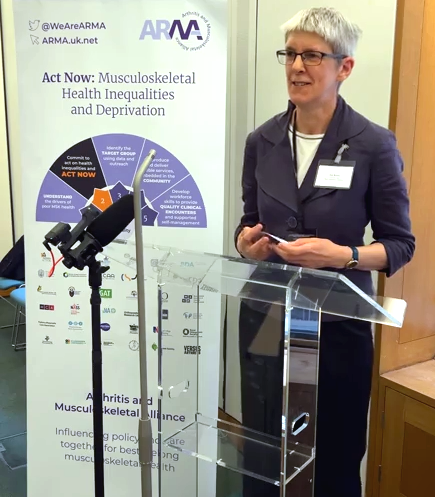 by Sue Brown, CEO ARMA
by Sue Brown, CEO ARMA
Last month I joined about 200 others at a government consultation event for the Ten Year Health Plan. Patient organisations, voluntary sector and professional bodies came together to get updates from the consultation process so far and discuss questions arising from the vision groups’ work.
Around our tables we were asked to consider one of three questions about how the NHS can make the shift to working more in partnership – with patients, communities and the voluntary sector. I can only speak for the discussion on my table, but I was somewhat disappointed at some organisations’ failure to engage with the question asked. Some people seemed stuck in answering the question “just how bad are things” in relation to their condition or profession. My contributions didn’t talk about MSK, because my answers were relevant to every condition.
We need to strike a balance between championing MSK because no one else will do that and engaging with the discussion that is happening. I am currently analysing the MSK related content of ICB Joint Forward Plans (look out for the report soon). It seems to echo the findings of our report last year – that ICBs pay insufficient attention to the biggest cause of years lived with disability in their population. Not to mention a massive proportion of their budgets. Clearly, we need to keep advocating for MSK until it gets the attention it deserves. But that can’t be the only thing we do.
Alongside the NHS Planning Guidance, published at the end of January, were guidelines on neighbourhood health. No mention of MSK, but I believe MSK has a vital role to play in neighbourhood health. There is a risk that MSK will be left out – indeed, I have heard of one area where that happened because MSK was seen as a secondary care function.
So even though the neighbourhood guidance doesn’t mention MSK, we need to be proactive in explaining why it fits there. We can’t do that effectively unless we first understand what the neighbourhood approach is trying to achieve. We can’t argue that MSK must be included because it’s important. We need to explain why it belongs there. Why it is integral. We need to explain what MSK contributes to the neighbourhood approach.
For years we have emphasised the need to see the whole person not just their MSK condition. That includes other long-term conditions, and the non-medical needs. There’s no point saying people with MSK conditions must be included in the first cohort of priority target groups: they already are. We need to make sure they are seen. We don’t want MSK community services working in siloes, separated from the neighbourhood teams. We need them properly integrated. We need the MDT approach to recognise the importance of MSK and chronic pain to people with other conditions. We need to talk about what MSK can do for the neighbourhood health, not what neighbourhoods should do for MSK.
So ARMA will continue to champion the importance of MSK until it gets the focus and profile it merits. But we will also engage in debates about the future of healthcare constructively and appropriately to ensure they benefit people with MSK conditions. Sometimes that will mean not even mentioning MSK.
It’s a question of balance.

